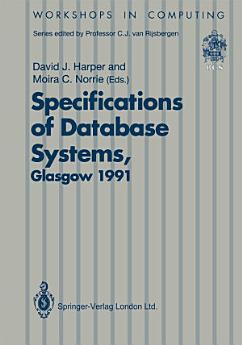Specifications of Database Systems: International Workshop on Specifications of Database Systems, Glasgow, 3–5 July 1991
David J. Harper · Moira C. Norrie
মাৰ্চ ২০১৩ · Springer Science & Business Media
ইবুক
323
পৃষ্ঠা
reportমূল্যাংকন আৰু পৰ্যালোচনা সত্যাপন কৰা হোৱা নাই অধিক জানক
এই ইবুকখনৰ বিষয়ে
Increasingly, formal specification is being used by database researchers to describe and understand the systems they are designing and implementing. Similarly, those working on formal specification techniques have recognised that the database field provides a rich context for developing their ideas. However, as experts in one field often have a relatively limited knowledge of the other, there is a growing need for discussion about the relationship between these two fields and how they can be usefully combined. This volume contains the 16 papers which were presented at the International Workshop on Specification on Database Systems, held in Glasgow, 3-5 July 1991. The purpose of the workshop was to bring together these fields and to examine, through a series of invited talks, presentations and working groups, the role that formal specification can play in developing database systems. The papers describe current research into topics such as the formal specification of data models, query languages and transaction handling and the use of formal specification techniques to understand problems which arise in database systems. The working groups, which are summarised at the end of the volume, covered a variety of issues including the role of graphical notations in database specification, the use of specification techniques in enabling "open" or extensible database systems and the education of the database community in specification techniques. This volume will be invaluable to the increasing number of researchers who are using both database systems and formal specification techniques in their work, and who wish to gain a more detailed knowledge of these two fields and the issues which affect them.
এই ইবুকখনক মূল্যাংকন কৰক
আমাক আপোনাৰ মতামত জনাওক।
পঢ়াৰ নির্দেশাৱলী
স্মাৰ্টফ’ন আৰু টেবলেট
Android আৰু iPad/iPhoneৰ বাবে Google Play Books এপটো ইনষ্টল কৰক। ই স্বয়ংক্রিয়ভাৱে আপোনাৰ একাউণ্টৰ সৈতে ছিংক হয় আৰু আপুনি য'তে নাথাকক ত'তেই কোনো অডিঅ'বুক অনলাইন বা অফলাইনত শুনিবলৈ সুবিধা দিয়ে।
লেপটপ আৰু কম্পিউটাৰ
আপুনি কম্পিউটাৰৰ ৱেব ব্রাউজাৰ ব্যৱহাৰ কৰি Google Playত কিনা অডিঅ'বুকসমূহ শুনিব পাৰে।
ই-ৰীডাৰ আৰু অন্য ডিভাইচ
Kobo eReadersৰ দৰে ই-চিয়াঁহীৰ ডিভাইচসমূহত পঢ়িবলৈ, আপুনি এটা ফাইল ডাউনল’ড কৰি সেইটো আপোনাৰ ডিভাইচলৈ স্থানান্তৰণ কৰিব লাগিব। সমৰ্থিত ই-ৰিডাৰলৈ ফাইলটো কেনেকৈ স্থানান্তৰ কৰিব জানিবলৈ সহায় কেন্দ্ৰত থকা সবিশেষ নিৰ্দেশাৱলী চাওক।





